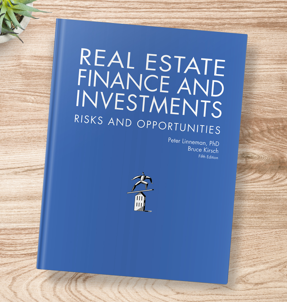Wharton Emeritus Professor Dr. Peter Linneman discusses the several most common traits of successful real estate entrepreneurs.
Executive summary:
- Entrepreneurs have in common a sense of urgency, passion and unwavering commitment to their business hypothesis
- Being an entrepreneur is not necessarily the road to riches
- Uncertainty in future outcomes prevents many from being comfortable electing to become entrepreneurs
Full interview transcript:
Bruce Kirsch: You have seen a lot of former students grow up in their careers and many of them launch out on their own as entrepreneurs. Aside from good luck and good timing, which always benefit everybody, what’s the most important thing about the entrepreneur that you think will impact their ability to be a success in their chosen endeavor?
Dr. Peter Linneman: There is a sense of urgency, there is a sense of passion, and there’s a sense of commitment to their vision that most people don’t have — maybe 1 percent of the people are real entrepreneurs and another 1 or 2 are kind of marginal. Most people just don’t have that commitment and passion and sense of urgency about their vision. It’s not about just wanting to work for yourself, you know, we all would kind of like “work for ourselves” — that’s not what it’s about. It’s about doing — there’s a sense of not just working for yourself, but walking to your own drummer. Sam Zell has, who’s an ultimate entrepreneur, has a phrase he’s used in my class: everybody else is marching left and you’re convinced marching right is the right direction to go… most people will go left — an entrepreneur will go right.
Now sometimes that can lead to disaster, but if you’re correct in your vision and you go right when everybody else is going left, you not only avoid disaster, but you exploit success when almost no one else is doing it. By the way, they’ll eventually come right, after some casualties from going left, they’ll catch up with you, but in the meantime you’ve built some advantage.
I’m not sure how much of it is innate, genetic, DNA — it’s like a great athlete: if you don’t have good hand-eye coordination, then you’ll never be a great basketball shooter. But if you have good hand-eye coordination, I can make you a better shooter by training. Some of that is natural and instinctual and some of it is improve with time and training and education. It’s not an either/or, it’s both.
Most people, also, Bruce, it’s funny, are not comfortable going to work not knowing what they’re going to do day after day after day. If you think about a normal person: I come in, I’ve got these nine things, these reports, these whatever’s, these asset reports that I’ve gotta do. An entrepreneur is far more ambiguous — that doesn’t mean they don’t have days when they know what they’re going to do, but it’s a far more ambiguous thing, because what I’m going to do today is go in and make it happen, whatever it is… could be phone calls, could be thinking, could be deciding something was a terrible idea, could be motivating people, could be attracting capital.
It’s amorphous in its shape, and most people don’t deal well with uncertainty. And the other thing I’d say is: when you’re an entrepreneur, it maybe sounds very glamorous when you’re rich and famous, but it’s not the route to riches… most entrepreneurs don’t make as much as they could if they just went and were an employee for someone, and had the safety and comfort.
When you’re an entrepreneur, you’re coming out of pocket, so not only are you not earning, you’re coming out of pocket to hire a secretary or lease space or put money into an idea that may be a bad idea — only time will tell. If I’m an employee, I’m getting my travel reimbursements, I’m getting my paycheck, and I’m not putting money out. I guess the thing that drives my wife nuts on my various entrepreneurial ventures is “who’s gonna pay this bill?”
So you go on a trip to raise money or you go on a trip to look at a piece of property maybe you want to buy or invest in, and you come back. Well if I’m doing it for a company I know exactly who’s going to pay my expenses. When you’re an entrepreneur, you not only didn’t make any money, by being paid that day by a company, you came out of pocket — that’s your expense, you ate it, and maybe you get it back some day, maybe you don’t, and most people just aren’t constitutionally cut out for coming out of pocket for very long. It’s emotionally challenging.
So those are the things, but a passion and a belief and a sense of urgency in their action.






Great interview segment. I agree 10000%. How do i get more info from Dr. Linneman?
I hear my own “drumming.” But i can hear the drumming of other entrepreneurs too and like marching to those beats as well. We shall form a drumming symphony of entreprenurship!
spot on description of the internal conflicts, traits and responsibilities of entrepreneurs. brought a big smile to my face,
Glad you liked it Mike
I have a different view than that of Mr. Linneman. Being an entrepreneur does not necessarily mean you will make less than you would as an employee. The way I see it is a common risk/return chart: as an entrepreneur you could do far better or far worse, but it’s all under your control. At a company you will be stable, but you may not grow for reasons that lie outside your skills and competencies. In all companies and professions there are controllable and non-controllable components. How you want those in % is up to you.